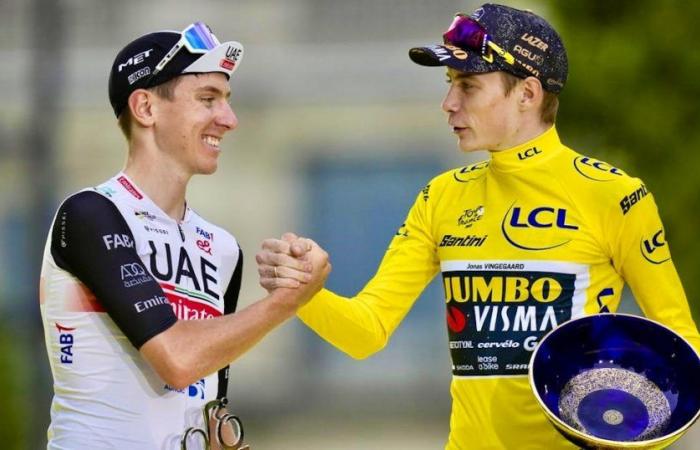In search of a rare double after his triumph at the Giro, Tadej Pogacar enters the Tour de France as a favorite. Facing him, the outgoing double winner Jonas Vingegaard is in uncertain form for this 111th edition with an exceptional cast.
Tour de France 2024: everything you need to know
Summer is coming and with it, the great annual cycling event: the Tour de France!
27.06.2024
A first major departure from Italy, a historic cycling nation. And an equally unprecedented arrival outside Paris, Olympic Games oblige, on a final time trial on Sunday July 21 between Monaco and Nice: it is a Grande Boucle like no other that takes off on Saturday in Florence, in the cradle of the Renaissance.
And it promises to be terribly exciting… The six big stars of world cycling – Tadej Pogacar, Jonas Vingegaard, Remco Evenepoel and Primoz Roglic for the general classification, as well as Mathieu van der Poel and Wout Van Aert who will mainly be aiming for stages – will be present for the very first time at the same time in the same race. Which was not a given given the many falls that decimated the peloton in the spring.
In the end, all that will be missing is Julian Alaphilippe, the darling of the French public already orphaned by the retired Thibaut Pinot, and a credible national candidate for a podium to make the party complete.
Titanic challenge
There are many points of interest. What level will Remco Evenepoel be able to reach for his first Tour de France, the phenomenon that sometimes still appears just in the high mountains? Can Primoz Roglic, emancipated from Vingegaard’s tutelage by joining the Bora team, apply for final victory, four years after being dispossessed of the yellow jersey by Pogacar in the final time trial?
Can Jonas Vingegaard seek a third consecutive coronation, which would undoubtedly be his greatest achievement after three months without racing following his accident at the Tour of the Basque Country?
But the question everyone is asking first is whether Tadej Pogacar can become the first rider since Marco Pantani in 1998 to win the Giro d’Italia and the Tour de France in the same year. This titanic challenge has only been completed by seven men in the entire history of cycling, all giants of the last century (Coppi, Anquetil, Merckx, Hinault, Roche, Indurain, Pantani).
By flying over the Giro almost ten minutes early, the Slovenian completed the first part of his major work. On the Tour, after his two victories in 2020 and 2021, he has come up against Vingegaard in the last two years, who has shown himself to be superior in the passes.
But this year, the balance is tilting the other way. Because Vingegaard will have a hard time being truly 100% after his serious accident at the beginning of April (multiple fractures to the ribs and collarbone, pneumothorax). And because Pogacar, who in 2023 was also coming back from injury, has never looked so strong, sharp as a blade and more poised on his time trial bike, an important element given that there will be two mountain trials on the menu.
At high altitude
The balance of power also seems to have reversed at the team level. That of Vingegaard, Visma-Lease a bike, so dominant last year to the point of winning the three major Tours, has been pursued by an incredible scoumoune since the start of the season, when Pogacar is at the head of a “Dream Team” at UAE (Yates, Ayuso, Almeida…).
The main uncertainty comes, in addition to Pogacar’s ability to withstand two major Tours in a row, in the Slovenian’s adaptation to high altitude, his weak point, especially when it is hot.
However, we will climb very high this year, notably during the terrible 19th stage where the peloton will successively climb the Col de Vars (2,109 m), the Cime de la Bonnette, the roof of the Tour (2,802 m!), before arriving at Isola 2000. As a consequence of the departure from Italy, the Galibier (2,642 m) will have to be crossed on the fourth day and the Tourmalet (2,115 m) will also be on the program in the Pyrenees.
For the rest, the first two stages already promise to be explosive: biggest drop in history for a first day on Saturday (3700 m), double ascent of the San Luca coast on Sunday.
After the Galibier, there will be a highly anticipated “grand cru” chrono in the vineyards between Nuits-Saint-Georges and Gevrey-Chambertin, a promising stage in the Massif Central towards Lioran and the crossing of the Pyrenees. Before a finale in the Alps and a final demanding time on Sunday July 21, in a postcard setting between Monaco and Nice.
Thirty-five years after the immortal duel between Laurent Fignon and Greg Lemond on the Champs-Elysées time trial, the organizers dream of an equally thrilling outcome.
A 3,498 kilometer route, in four countries
- The 111th edition of the Tour de France, which starts Saturday in Florence, will visit four countries – Italy, San Marino, Monaco and France – over 21 stages. The riders will cover a total distance of 3,498 kilometres to Nice.
- This will be the 26th departure from abroad of the Grande Boucle, which will then pass through seven regions and 30 departments of France. It will arrive for the first time in its history in Nice, and not in Paris, due to the Olympic Games (July 26-August 11).
- Of the 21 stages, there will be 8 plain stages, 4 hilly stages, 7 mountain stages with 4 altitude finishes and two individual time trials. Added to this are two days of rest. Here are the stages of the Tour de France 2024:
- June 29: 1st stage Florence (Italy) – Rimini (Italy), 206 km
- June 30: 2nd stage Cesenatico (Italy) – Bologna (Italy), 199.2 km
- July 1: 3rd stage Piacenza (Italy) – Turin (Italy), 230.8 km
- July 2: 4th stage Pinerolo (Italy) – Valloire, 139.6 km
- July 3: 5th stage Saint-Jean-de-Maurienne – Saint-Vulbas, 177.4 km
- July 4: 6th stage Mâcon – Dijon, 163.5 km
- July 5: 7th stage Nuits-Saint-Georges – Gevrey-Chambertin (individual time trial), 25.3 km
- July 6: 8th stage Semur-en-Auxois – Colombey-les-Deux-Eglises, 183.4 km
- July 7: 9th stage Troyes – Troyes, 199 km
- July 8: rest in Orléans
- July 9: 10th stage Orléans – Saint-Armand-Montrond, 187.3 km
- July 10: 11th stage Evaux-les-Bains – Le Lioran, 211 km
- July 11: 12th stage Aurillac – Villeneuve-sur-Lot, 203.6 km
- July 12: 13th stage Agen – Pau, 165.3 km
- July 13: 14th stage Pau – Saint-Lary-Soulan Pla d’Adet, 151.9 km
- July 14: 15th stage Loudenvielle – Plateau de Beille, 197.7 km
- July 15: rest in Gruissan
- July 16: 16th stage Gruissan – Nîmes, 188.6 km
- July 17: 17th stage Saint-Paul-Trois-Châteaux – Superdévoluy, 177.8 km
- July 18: 18th stage Gap – Barcelonnette, 179.5 km
- July 19: 19th stage Embrun – Isola 2000, 144.6 km
- July 20: 20th stage Nice – Col de la Couillole, 132.8 km
- July 21: 21st stage Monaco – Nice (individual time trial), 33.7 km
AFP






